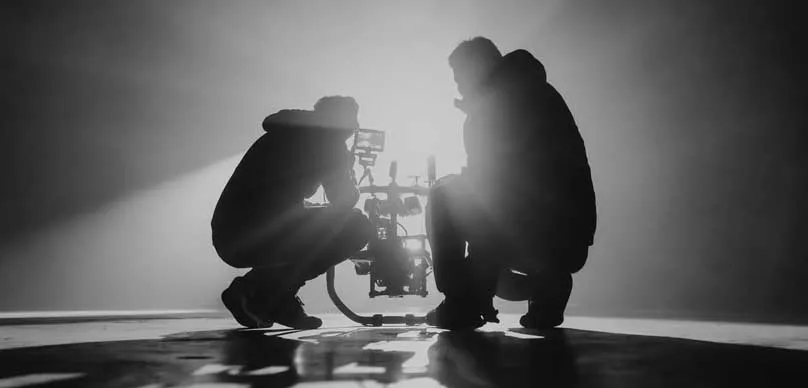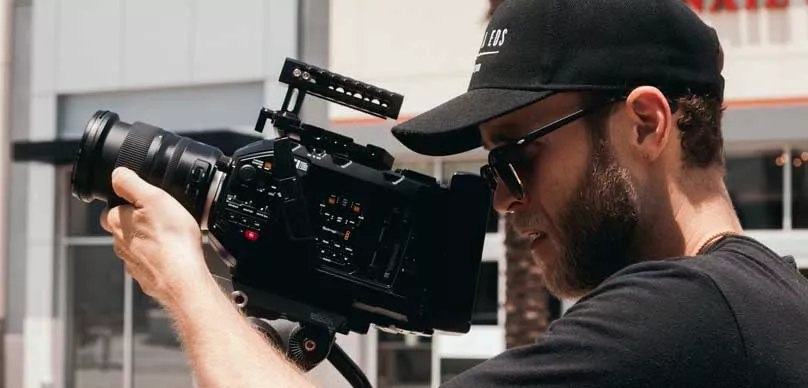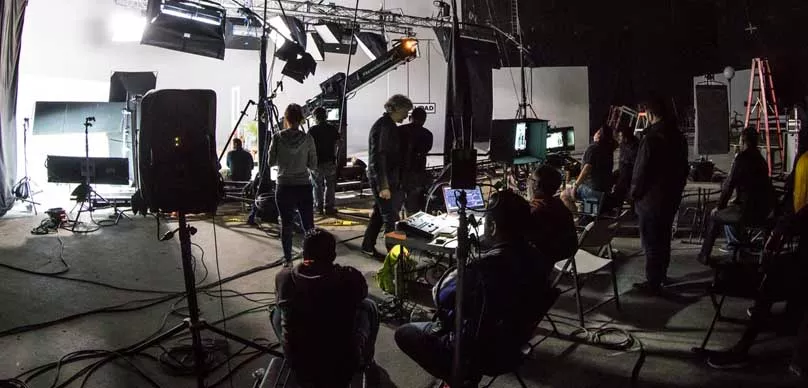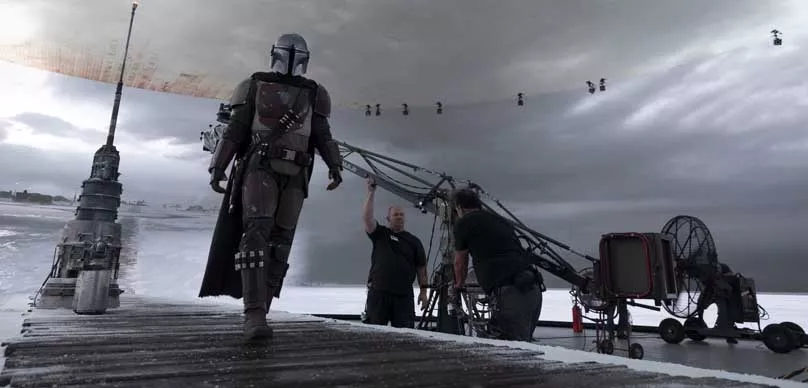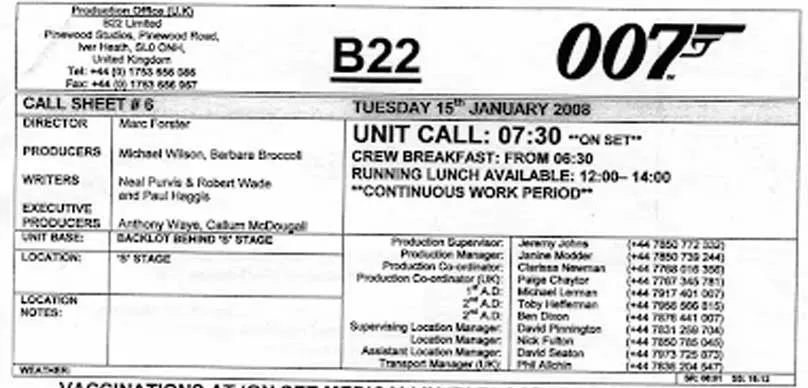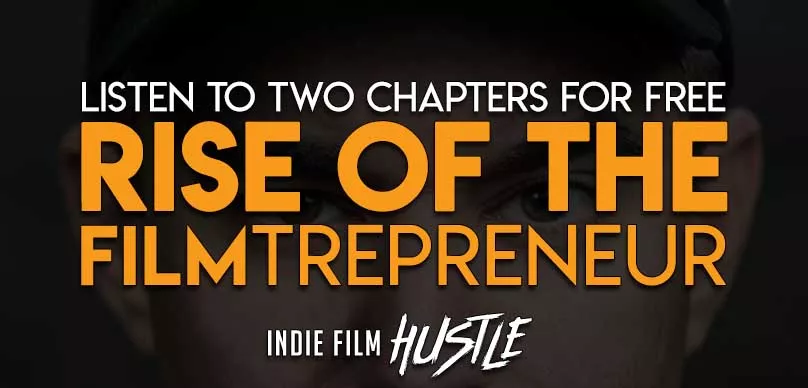This week on our Indie Film Hustle filmmaking podcasts, we discuss my misadventures in Hollywood with my short film BROKEN (Watch it on Indie Film Hustle TV). I talk about how to be ready if and when the spotlight of Hollywood is on you and your project. What to do in those meetings and how NOT to waste the opportunity.
My journey with BROKEN, believe or not is still going strong, ten years later.
I was released in a compilation in the UK two years ago under the title LIPSTICK & BULLETS. I was then approached by another distributor to release it in the US and the rest of the world.
That this little $8000 short film still is moving forward and paying dividends is a mystery to me. When it was first released back in 2005 on a self-distributed DVD I received a ton of attention for it. The field was not nearly as crowded as it is today but nevertheless, I did get some accolades. Then Hollywood came calling soon after.
My misadventures soon followed.
From trips to the Sundance Film Festival and Toronto International Film Festival to meeting at studios in Los Angeles, to bizarre meetings with producers and distributors who wanted to work with me. Just nutz.
So I wanted to focus an episode on what to do when that spotlight hits you and your project. I had no one to tell me so I hope this helps you guys out and that all of you and your films get a shot at the brass ring. So sit back and enjoy my bizarre misadventures in Hollyweird.
Enjoy!
Right-click here to download the MP3
Alex Ferrari 0:00
So today I wanted to talk about being prepared when and if the spotlight ever hits you, I'm going to tell you a little story about what happened to me. I did a movie many years ago called broken. It was a short, a short film that we did for about $1,000 we shot it on mini DV that's how far back it goes. With no stars. We shot it in Florida West Palm Beach, Florida actually. And, and I did all the posts on it, I did pretty much everything on it. You know, directed wrote it did all the color all the posts of the editing, production design it pretty much everything had an amazing crew had amazing, amazing producer. Working with me as well, and co writer of the script, George Rodriguez, who did a fantastic job as well, I couldn't we couldn't have made the movie without. Without everybody involved. I had a great cast. And also all everybody was awesome. So we go on, and I go on to make this movie and we release it. And we get into over 250 film festivals around the world. We win countless awards. We are covered by over three 400 different news outlets. every movie website, you can imagine covered us. I haven't got a review by Roger Ebert, which is a story for another time how I cut that and I will I promise you, I will tell you that story. in an upcoming episode. We did all this stuff. And then I had the idea of like, Well, you know what, let's see how we can make some money with this. How can we actually monetize this? This thing, and this is before YouTube really had taken off. There was no online streaming really. There's no online deliverables, VOD was still very early in its stages. And again, don't forget, this is a short film with no, no stars in it. These are all unknown local actors in Florida. It was an action movie was an action thriller. You know, we boasted over 100 visual effects in it. And, you know, we did we had a great visual effects team that helped us do that, as well. All young kids, we were all, you know, young, just starting out really doing this. So afterwards, we decided I decided I wanted to put together some way of making how to sell this. So what I decided to do is during the process of making broken, I looked everywhere and could not find, believe it or not, could not find anything about how to make a low budget movie online or on DVD or anything like that. This is 2004 when this happened, so the DVDs were all you know, all big budget, you know, Titanic and matrix and all that kind of stuff. But then it really did help me out a lot because I didn't have that budget, we had eight grand in shooting on mini DV. And there was no there was nobody really talking about it at the time. So what I decided to do is put together a kind of guerrilla film school on my DVD, when it was all said and done took me about six to eight weeks of editing and shooting and putting it all together working pretty much 10 to 12 hours a day at my company num robot just basically locked everybody else out and just did this for a long, long time. And packaged it and we had about five, almost five and a half out Is it the note three and a half hours of about three and a half hours of extra footage. We had five commentary tracks from everything really educational stuff we took you through pre production, production, post production, and even marketing of the film, which I'll get to in a minute. So I put this all into DVD, packaged it very nicely and started selling it. We put out the we put out the word online did a lot of marketing online for the film. They're arguably to say you couldn't go on to a film, message board or website anywhere in the indie film world and not hear about this movie called broken. So we released it and we ended up selling over 5000 copies of it, selling it at around about $20 a pop sometimes you sell for 15 we did a bunch of different events as well. You know horror festivals, comic book festivals, things like that Comic Cons and all that kind of stuff. Anything to get the movie out to promote, promote, promote, promote, promote. And then funny thing happened is I started getting phone calls from Hollywood from studios. I got a call from an Oscar. Winning producer who wanted to meet with me about my projects about broken about anything else I might have. I was flown out, I met with, you know, Sony, Paramount Warner's everybody. New Line, a bunch of different companies wanted to talk to me. So one thing that I had learned and I didn't know at the time is, when I was invited to these meetings, they're like this, this little movie you made is great. We're really excited about it. What else do you have. And that was the big mistake. I had nothing. I had ideas. I had, I had an idea for a feature for the broken feature. I had some other ideas for some other movies, but I had no script. And what happens in Hollywood is when you are if the spotlight, if you are blessed with the spotlight hitting you even for a moment, you better be prepared to take advantage of it. And I wasn't, I was not prepared at all. I went into all these meetings, pretty much like a deer in headlights, I had no experience, I had no one telling me what to do. Again, the knowledge, the information was not out there as much as it is today. But even then, what I'm talking about, I don't really read a whole heck of a lot about. So what happened was, I went back to Florida, and started writing a script with my partner, we start putting the script together. You know, we're flown up to the Toronto Film Festival to meet with some distributors. were flown to Sundance and we're hanging out, you know, doing parties and doing, you know, meeting actors and all this kind of stuff. And again, everyone's like, hey, so where's the script? Where the script? Oh, yeah, we're working on it. And then when we finally got it done, a year later, the the heat was off, the spotlight had dimmed or if not, it's completely out. Nobody was really taking our calls anymore. then moved on to the next hot thing, or the next filmmaker, the next movie that we're going to try to do something with. So I, I was left heartbroken. Pretty much, you know, all I had, I had made all these contacts, but again, the doors just kept closing afterwards. Because you know, the script, they're like, Oh, yeah, we'll take a look at the script. And then we wrote this script that was, you know, I'll be honest with you, it was kind of god awful. It was, it was like $150 million budget script kind of thing. I mean, we went crazy with it. Again, we didn't know we had no idea how the game was played. It was a lesson at heart in the school of hard knocks, if you will, what I wanted to give you. The reason I'm telling you guys this story is I wanted to give you some tips on if you are blessed once once you make your movie, either Feature or Short, or a web series, or whatever gets attention for you. And you do go into these meetings. And you do get called by Hollywood, by, by producers, by directors, by entertainment attorneys by anybody who really wants to see what they can do with you, or help you or move you forward. In one way, shape, or form. These are some tips that I've picked up along the way. And I've also seen this through working with so many really amazing and talented filmmakers who have gone down similar paths with that I went down but they went down a little farther than I did, they had scripts ready, and how that process worked. And as the as this show, and as indie film hustle keeps growing in the future, I'm going to keep bringing these stories in, I'm going to I'm doing my best to bring in my friends, people who have worked within the industry, who have gone through the gambit gone through the machine, how they're building their careers, how they're getting to the next level, in their careers, as directors, as writers, as editors as cinematographers as whatever avenue of the industry they have done. So here's some tips. First and foremost, have multiple scripts prepared. If you're going to do something like you know, make your first movie, I know it's tough, because it's tough enough to make one good script, but at least either have access to scripts, either option scripts, which isn't a whole other conversation, but have option scripts, access to scripts, or write your own scripts, at least one or two different scripts that is that are in the exact same genre as the film that you've made. So in other words, if you make a slapstick comedy, don't drop a horror script on the desk, it's not gonna fly, they're not gonna they're looking at you. And this is one thing Hollywood loves to put people in boxes. And once they have you in a box, that's your box later on, you can break out of that box. But until then, you're going to be in this box until you prove otherwise. So if you made a good horror movie, they're going to go look for you to make another horror movie, because that's what they've seen. If they haven't seen you make a comedy or a drama. They don't want to hear it, it's too much risk. It's risky enough to even be bringing in an independent filmmaker without a track record to make a feature film, let alone start mixing genres and mixing things like that. So make sure you have multiples reps not ideas full fledged out, fleshed out scripts that are ready to go and literally less, let's go do some breakdowns on them. And here's a budget and go make them. Okay, at least give them something and it might be the third or fifth draft, and you're going to rewrite it, I promise you, if you get a movie produced, you're gonna write it at least 40 or 50 times. It's just the way the game is played in and out here in Hollyweird. But it's just the way it is. So make sure you have multiple scripts of the same genre that you have going. So if you made an action, have some multiple action scripts done, if you made a Thriller Horror, have that if you made comedy, have a couple comedy scripts ready. So that would be first step. Second, make sure you look at the long term plan is when you're when you're designing your career, when you're designing your your way into this business or, or in your way of making a living. Look at the long term game, don't look at it as the short game. The overnight success is the lottery tickets is like the lottery ticket winners like the Robert Rodriguez is and the Kevin Smith's of the world. paranormal activity or any of those guys, those guys are lottery tickets. That happens once every, you know, in a generation, I can count on both my hands over the last 30 years, how many times that's happened. But everyone thinks that that can happen to them. It's unrealistic to think that you're going to be that lottery ticket that someone's going to come in and go, you you come You come with me, I'm gonna make you let you direct this next one, it happens, but it's rare. So for the rest of us, think of a long term plan of how you're going to get things. So if you're going to make a short film, okay, what is the short film going to lead to? Are you just making it just to make it? Are you making it to kind of just kind of play or kind of hone your skills, great, that's fine. But if you're going to make something to put a really out there and God, God willing, some action happens off of it, some sort of press some sort of interest in you as a filmmaker, happens, you better be ready. So have some sort of long term plan, have some scripts ready, have some other shorts ready, have a web series ready to have a TV show ready, a bunch of different things. Just think about what this will lead to. And then if I do this, there's just think about different options of what will happen to you. If Okay, if I go to if I make a short film, and I get a call from a producer, I'll have a couple scripts ready, boom, boom, boom, boom. I hope this story helped you guys out a little bit. It was a long, painful, a long, painful journey. For me, as a filmmaker, I learned a ton, I'm still learning a ton. But Funny thing is that, and I'll go into this again, also in other episodes, but that little movie broken has paid me off in so many ways, not only financially that it was an actual, you know, financial success and actually made money on the short and continue to make money off the short that I got picked up by a distributor to be packaged in with a bunch of my other movies that I've made. And it's going to be released September, I think, September 6 2015. And it's called lipstick and bullets and has a combination of four movies, I did broken sin, red princess blues, and red princess blues, red princess blues Genesis, and an animated prequel to references Bruce, and that has about five and a half hours of behind the scenes stuff. It's currently available in blu ray from England. And I think you'd be able to play that in its region zero, so you can play that anywhere in the world. And then now it's being re released again, for America and the rest of the world, September 6. So that's pretty amazing in my eyes, that a short film or a group of short films 10 years later, are getting released in a national way. Walmart's, the Amazons, the Netflix and so on. It's because content was was done really well. So when you're making stuff when you make creating stuff, create the best stuff, you can create the highest quality content you can. When I made broken I wanted to help as many filmmakers as I could, because I couldn't find what I was looking for. And that same energy and same love for our business is why I created indie film hustle, I wanted to create a space a place where people can come and learn things that I don't see being talked about out there very often. Real inside stuff from the industry and help you guys get your movies made. And hopefully strive and survive the film business make a living doing what you love. So that's why I'm doing indie film hustle as a general statement. So I'm going to be breaking up broken in other podcasts and other my other films because of the experiences and things that I went through with them. This is just one aspect of broken broken has a ton of different avenues that I went down with it between the marketing of it. How I got Roger. Roger Ebert, the legendary Roger Ebert, rest in peace. Have him actually give me a pause. Review of my nobody short film that was not in the festival that he was at at the time, kind of thing, my Sundance adventures, which there are multiple, what I did at Sundance and so on. I'll be going through all of that in future episodes and stuff like that. So guys, I hope this helped you guys out a lot. I hope I didn't ramble ramble too much and keep an eye out for the new episodes, we're going to try to do them every couple weeks. And again, if you want to learn how I got into over 500, film festivals, international film festivals, and most of them I got into for either free or cheap, head over to film festival tips.com that's Film Festival tips calm to sign up for our awesome newsletter to get insight tips and stuff and I'll send it right over to you get the download it, share it with friends if you need to. It's really I think it's really good and help it's verbatim what I did to do to get into film festivals. And I even give you guys some email templates as well how to email the film festival directors and things like that. So thanks again guys, and I will see you guys soon. Thanks.
Sign up to receive email updates
Enter your name and email address below and I'll send you periodic updates about the podcast.
YOUTUBE VIDEO
LINKS
- BROKEN (Watch it on Indie Film Hustle TV)
SPONSORS
- Bulletproof Script Coverage – Get Your Screenplay Read by Hollywood Professionals
- Audible – Get a Free Filmmaking or Screenwriting Audiobook
- Rev.com – $1.25 Closed Captions for Indie Filmmakers – Rev ($10 Off Your First Order)














